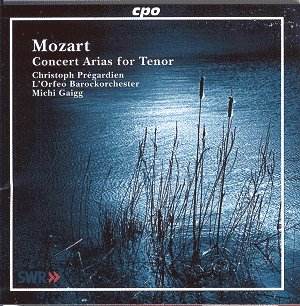Mozart composed more
than fifty arias in addition to those
found within his operas. He did so at
every stage of his career, and always
for one of two reasons. The majority
were conceived as 'insertion arias'
in an existing opera by himself or someone
else, in order to suit the needs of
a particular singer. The other examples
were genuine 'concert arias', intended
to display a singer's prowess in the
context of a concert performance, while
still retaining an operatic style. The
great majority of these marvellous pieces
were composed for the soprano voice,
but as this interesting compilations
shows, those for tenor are distinctive
too. Together they form a significant
part of his creative work. Nor should
their relative neglect deflect from
the excellence of the music, which is
thoroughly worthy of Mozart's genius.
For these reasons Christoph Prégardien's
new collection is to be welcomed.
What of the performances?
Firstly, the sound is clean and fresh,
in a suitable acoustic surrounding.
As the name tells us, L'Orfeo Barockorchester
is an 'original instrument' band, and
they play with a fresh, incisive enthusiasm.
The quality of their string intonation
is not unpleasing, but as with other
ensembles of this type, the music misses
some of its more expressive warmth in
this style of playing. The balance of
voice and orchestra is effectively achieved,
and is particularly successful in making
the most of the directness and artistry
of the early pieces. These may not be
as deeply artistic or expressive as
the later music, but as these examples
show, they are well worth our attention.
Prégardien's
tone is certainly pleasing, and if there
are signs of strain in some of the larger
recitative sections, such as the opening
phase of 'Misero! O sogno', the tension
created is not inappropriate to the
music. Some of these pieces are quite
extensive, running to ten or more minutes,
and that in itself is a challenge to
the performers. For example, 'Se il
labbro mio con credi, K295, runs for
more than eleven minutes, and is important
in Mozart's development as a composer.
It was written in Mannheim in 1778,
when he was en route for Paris. The
intended singer was the eminent Anton
Raaff, for whom he would soon create
the part of Idomeneo. Mozart regarded
Raaff as 'the most famous tenor in the
world', and he therefore made a special
effort to write something distinctive
and substantial for him. This performance
is sensitive to the aria's needs, and
is well shaped and lovingly phrased.
Only the final degree of expressive
warmth (see above) is lacking). In any
case, it is a highlight of the disc.
All praise to CPO for
adding a couple of purely orchestral
items: the early Symphony in E flat,
K16, and the celebrated Divertimento
in F, K138. The latter performance is
less successful than the former, largely
because the phrasing and emphases of
the finale fail to articulate the music
clearly enough. Perhaps the keyboard
continuo is too loud also. But the Symphony
is another matter. Although it is hardly
a masterpiece, Gaigg's conducting captures
just the right tone, at once fresh and
direct.
With excellent presentation
including full texts and translations,
this disc has much to commend it.
Terry Barfoot



